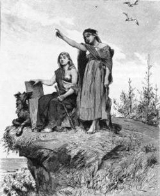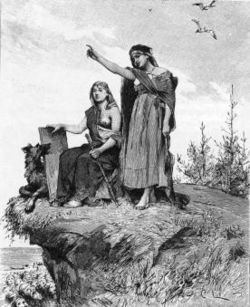
Galdr
Encyclopedia

Old Norse
Old Norse is a North Germanic language that was spoken by inhabitants of Scandinavia and inhabitants of their overseas settlements during the Viking Age, until about 1300....
word for "spell, incantation
Incantation
An incantation or enchantment is a charm or spell created using words. An incantation may take place during a ritual, either a hymn or prayer, and may invoke or praise a deity. In magic, occultism, witchcraft it may be used with the intention of casting a spell on an object or a person...
", and which was usually performed in combination with certain rites. It was mastered by both women and men and they chanted it in falsetto
Falsetto
Falsetto is the vocal register occupying the frequency range just above the modal voice register and overlapping with it by approximately one octave. It is produced by the vibration of the ligamentous edges of the vocal folds, in whole or in part...
(gala).
Etymology
The Old Norse word galdr is derived from a word for singing incantations, gala (Old High GermanOld High German
The term Old High German refers to the earliest stage of the German language and it conventionally covers the period from around 500 to 1050. Coherent written texts do not appear until the second half of the 8th century, and some treat the period before 750 as 'prehistoric' and date the start of...
and Old English: galan) with an Indo-European
Indo-European
Indo-European may refer to:* Indo-European languages** Aryan race, a 19th century and early 20th century term for those peoples who are the native speakers of Indo-European languages...
-tro suffix. In Old High German the -stro suffix produced galster instead.
The Old English
Old English language
Old English or Anglo-Saxon is an early form of the English language that was spoken and written by the Anglo-Saxons and their descendants in parts of what are now England and southeastern Scotland between at least the mid-5th century and the mid-12th century...
forms were gealdor, galdor, ȝaldre "spell, enchantment, witchcraft", and the verb galan meant "sing, chant". It is contained in nightingale
Nightingale
The Nightingale , also known as Rufous and Common Nightingale, is a small passerine bird that was formerly classed as a member of the thrush family Turdidae, but is now more generally considered to be an Old World flycatcher, Muscicapidae...
(from næcti-galæ), related to giellan, the verb ancestral to Modern English yell; cf. also the Icelandic verb að gala "to sing, call out, yell". In Dutch language
Dutch language
Dutch is a West Germanic language and the native language of the majority of the population of the Netherlands, Belgium, and Suriname, the three member states of the Dutch Language Union. Most speakers live in the European Union, where it is a first language for about 23 million and a second...
gillen.
The German forms were Old High German galstar and MHG
Middle High German
Middle High German , abbreviated MHG , is the term used for the period in the history of the German language between 1050 and 1350. It is preceded by Old High German and followed by Early New High German...
galster "song, enchantment" (Konrad von Ammenhausen
Konrad von Ammenhausen
Konrad von Ammenhausen was a Swiss Benedictine monk and priest at Stein am Rhein.He is primarily known for his Schachzabelbuch, a Middle High German verse translation of the Liber de moribus hominum et officiis nobilum ac popularium super ludo scacchorum by Jacobus de Cessolis, completed in 1337...
Schachzabelbuch 167b), surviving in (obsolete or dialectal) Modern German Galsterei (witchcraft) and Galsterweib (witch).
Practice
The incantations were composed in a special meter named galdralag. This meter was similar to the six-lined ljóðaháttr but adds a seventh line. Another characteristic is a performed parallelism, see the stanza from SkirnismálSkírnismál
Skírnismál is one of the poems of the Poetic Edda. It is preserved in the 13th century manuscripts Codex Regius and AM 748 I 4to but may have been originally composed in heathen times...
, below.
A practical galdr for women was one that made childbirth easier, but they were also notably used for bringing madness onto another person, whence modern Swedish
Swedish language
Swedish is a North Germanic language, spoken by approximately 10 million people, predominantly in Sweden and parts of Finland, especially along its coast and on the Åland islands. It is largely mutually intelligible with Norwegian and Danish...
galen meaning "mad". Moreover, a master of the craft was also said to be able to raise storms, make distant ships sink, make swords blunt, make armour soft and decide victory or defeat in battles. Examples of this can be found in Grógaldr
Grógaldr
Grógaldr or The Spell of Gróa is the first of two poems, now commonly published under the title Svipdagsmál found in several 17th century paper manuscripts with Fjölsvinnsmál. In at least three of these manuscripts, the poems are in reverse order and separated by a third eddic poem titled, Hyndluljóð...
and in Frithiof's Saga. In Grógaldr
Grógaldr
Grógaldr or The Spell of Gróa is the first of two poems, now commonly published under the title Svipdagsmál found in several 17th century paper manuscripts with Fjölsvinnsmál. In at least three of these manuscripts, the poems are in reverse order and separated by a third eddic poem titled, Hyndluljóð...
, Gróa
Gróa
In Norse mythology, Gróa is a völva and practitioner of seiðr, the wife of Aurvandil the Bold.-Prose Edda:Gróa appears in the Prose Edda book Skáldskaparmál, in the context of Thor's battle with the jötunn Hrungnir...
chants nine (a significant number in Norse mythology
Numbers in Norse mythology
The numbers three and nine are significant numbers in Norse mythology and paganism. Both numbers appear throughout surviving attestations of Norse paganism, in both mythology and cultic practice....
) galdrs to aid her son, and in Buslubœn, the schemes of king Ring of Östergötland
Östergötland
Östergötland, English exonym: East Gothland, is one of the traditional provinces of Sweden in the south of Sweden. It borders Småland, Västergötland, Närke, Södermanland, and the Baltic Sea. In older English literature, one might also encounter the Latinized version, Ostrogothia...
are averted.
It is also mentioned in several of the poems in the Poetic Edda
Poetic Edda
The Poetic Edda is a collection of Old Norse poems primarily preserved in the Icelandic mediaeval manuscript Codex Regius. Along with Snorri Sturluson's Prose Edda, the Poetic Edda is the most important extant source on Norse mythology and Germanic heroic legends, and from the early 19th century...
, and for instance in Hávamál
Hávamál
Hávamál is presented as a single poem in the Poetic Edda, a collection of Old Norse poems from the Viking age. The poem, itself a combination of different poems, is largely gnomic, presenting advice for living, proper conduct and wisdom....
, where Odin
Odin
Odin is a major god in Norse mythology and the ruler of Asgard. Homologous with the Anglo-Saxon "Wōden" and the Old High German "Wotan", the name is descended from Proto-Germanic "*Wodanaz" or "*Wōđanaz"....
claims to know 18
Numbers in Norse mythology
The numbers three and nine are significant numbers in Norse mythology and paganism. Both numbers appear throughout surviving attestations of Norse paganism, in both mythology and cultic practice....
galdrs. For instance, Odin
Odin
Odin is a major god in Norse mythology and the ruler of Asgard. Homologous with the Anglo-Saxon "Wōden" and the Old High German "Wotan", the name is descended from Proto-Germanic "*Wodanaz" or "*Wōđanaz"....
mastered galdrs against fire, sword edges, arrows, fetters and storms, and he could conjure up the dead and speak to them. There are other references in Skírnismál
Skírnismál
Skírnismál is one of the poems of the Poetic Edda. It is preserved in the 13th century manuscripts Codex Regius and AM 748 I 4to but may have been originally composed in heathen times...
, where Skirnir
Skirnir
In Norse mythology, Skírnir is the god Freyr's messenger and vassal. In the Poetic Edda poem Skírnismál, Skírnir is sent as a messenger to Jötunheimr to conduct Freyr's wooing of the fair Gerðr on condition of being given Freyr's sword as a reward. Skírnir also threatens Gerðr with his gambantein,...
uses galdrs to force Gerðr to marry Freyr
Freyr
Freyr is one of the most important gods of Norse paganism. Freyr was highly associated with farming, weather and, as a phallic fertility god, Freyr "bestows peace and pleasure on mortals"...
as exemplified by the following stanza:
|
Suttung In Norse mythology, Suttungr was a Jötunn, a son of Gilling, who had been murdered by Fjalar and Galar.- Mythology :... , |
A notable reference to the use of galdrs is the eddic poem Oddrúnargrátr
Oddrúnargrátr
Oddrúnargrátr or Oddrúnarkviða is an Eddic poem, found in the Codex Regius manuscript where it follows Guðrúnarkviða III and precedes Atlakviða....
, where Borgny could not give birth before Oddrún had chanted "biting galdrs" (but they are translated as potent charms, by Henry Adams Bellows
Henry Adams Bellows
Henry Adams Bellows was a lawyer, state legislator, and jurist born in Rockingham, Vermont. He was elected to the New Hampshire House of Representatives from Littleton, New Hampshire in 1839. He was subsequently elected again to the House from Concord, New Hampshire in 1856–1857, and served as...
below):
|
Frigg Frigg is a major goddess in Norse paganism, a subset of Germanic paganism. She is said to be the wife of Odin, and is the "foremost among the goddesses" and the queen of Asgard. Frigg appears primarily in Norse mythological stories as a wife and a mother. She is also described as having the power... and Freyja |

